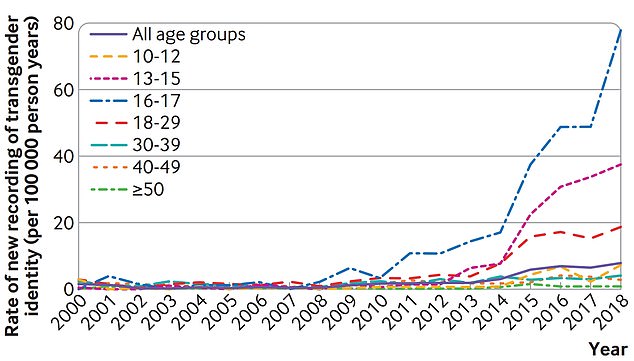One in six transgender people have long-term mental health problems, new research suggests.
In the first study of its kind, those identifying as transgender were significantly more likely to suffer health issues such as depression and anxiety than the rest of the population.
Researchers at the University of Manchester analysed GP survey data from 1.5 million patients, including 8,000 who identified as transgender.
They found 1 in 6 transgender men and women reported mental health issues compared to one in ten other men and women.
A lack of NHS gender services and difficulties communicating with healthcare staff were blamed for some of the mental health problems.

Researchers at the University of Manchester analysed GP survey data from 1.5 million patients, including 8,000 who identified as transgender. They found 1 in 6 transgender men and women reported mental health issues compared to one in ten other men and women

Figures released in November by University College London shows rates of newly recorded transgender identity from 2000 to 2018, by age group. In 2000, there was 1.45 new cases of transgender identify per 100,000 person-years. But this figure jumped five-fold to 7.81 cases per 100,000 in 2018
But campaigners say the findings are based on ‘ideologies’ rather than biological facts and should never have been commissioned using public money.
They suggest it has ‘unreliable figures at its core’ from a survey involving gender questions that are likely to have confused some participants.
Researchers used data from the English GP Patient Survey in 2021 and 2022, which in 2021 introduced more answer choices to questions on gender identity.
People were asked how they identified their gender — female, male, non-binary, prefer to self-describe and prefer not to say.
They were also asked how their gender identity compared with their sex registered at birth, whether cisgender, transgender, or if they preferred not to say.
They were also asked if they had a mental health condition and if they felt the healthcare professional recognised or understood any mental health needs they might have had.
Some 16.4 per cent of people identifying as transgender men and 15.9 per cent identifying as transgender women reported having a mental health issue, although no details were asked for.
This compared to 8.8 and 12 per cent of cisgender — those identifying as the same sex they were born — men and women, respectively, according to the findings published in Lancet Public Health.
Dr Ruth Watkinson, of the University of Manchester, said: ‘Poor communication from healthcare professionals and inadequate staff-patient relationships may explain why trans, non-binary, and gender diverse patients were more likely to report their mental health needs were not met at recent general practice appointments.
‘Changes are urgently needed for the NHS to become a more supportive service to transgender, non-binary, and gender diverse patients, including improved recording of gender across healthcare records systems and staff training to ensure healthcare professionals meet the mental health needs of all patients, whatever their gender.’
But Sex Matters, a human-rights organisation that campaigns for clarity on sex in law and everyday life, questioned the terminology used in the paper, which were based on recommendations by controversial trans lobbying group Stonewall.
Maya Forstater, executive director, said: ‘It is ridiculous that a government-funded public health study should be based on unreliable data on sex and steeped in ideological language.
‘The data at the heart of this study is from a survey that asked the same problematic gender identity question as the 2021 census, which is currently being reviewed by the national statistics regulator.
‘The gender identity question in the census was widely misunderstood, and many people were mistakenly classified as transgender.
‘Results suggested that 1 in 67 Muslim people are transgender and that there are more trans people in Newham than Brighton.
‘So this study has unreliable figures at its core, and cannot be used to draw conclusions about complex mental health needs.
‘The paper also uses the term “cisgender” 74 times, suggesting that it prioritises ideology over biological fact.’
The study was funded by the Department of Health and Social Care (DHSC) and the National institute for Health and Care Research (NIHR) and was carried out in collaboration with staff from The Proud Trust and LGBT Foundation.
An NHS spokesperson said: ‘Mental health is one of five key priority areas for the NHS in its efforts to reduce healthcare inequalities, while the health services has opened five new Adult Gender Dysphoria Clinics in England since 2020 to reduce waiting times.’










